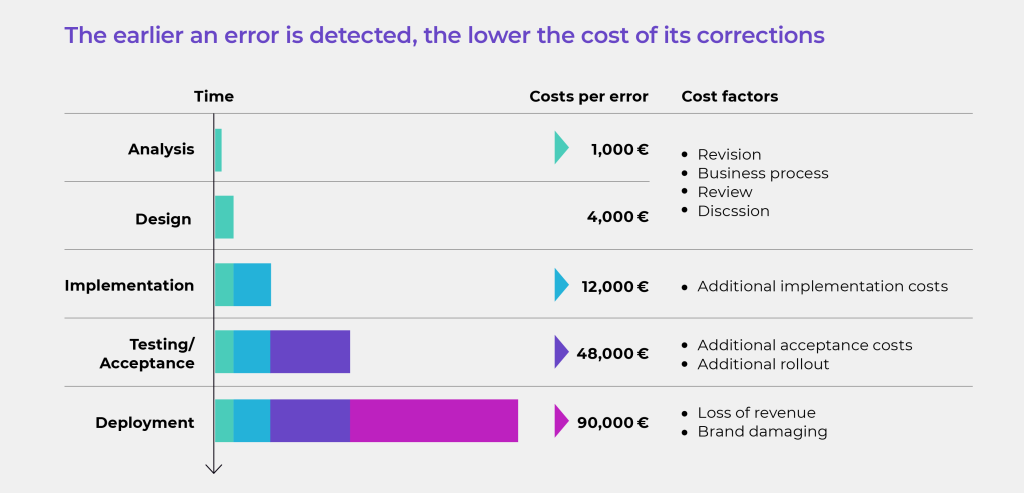3 ways to help your IT teams become super-efficient
IT leaders are likely to face increasing economic and HR pressure in the coming months, whilst needing to deliver more solutions and at a faster rate to implement their company’s digital strategy.
Based on our global study of over 2000 client projects in IT, we have practical tips that you can implement in your Data, Dev and QA projects to reduce waste in time, effort, and budget.
As a technology services provider, we have worked with hundreds of leading organisations in the UK & Ireland, including NHS, Ofgem, OVO Energy and Eir, and have noticed that CIO, CTO and IT managers often face frustrations with:
Business Alignment
There are a large number of digital transformation projects that are started but never completed. Often, it is due to the discrepancy between the business units' needs and the solutions designed, frequently due to misalignments between expectations, requirements, and means of development.
Value generator vs cost centre
The need to continuously defend against IT budget cuts. IT & digital departments usually suffer from 10-20% budget cuts every year. Calculating the return on investment of digital transformation initiatives requires vast data investigation and analysis, for example it takes time to calculate how many hours were saved by an admin-related app.
Tech talent shortage
A survey by Hays highlights that the shortage of skilled tech talent in the UK is a growing concern, with 94% of employers facing a lack of talent in 2022, up from 89% in 2021. With the shortage set to continue, organisations should focus on talent retention (e.g., a better work/life balance and meaningful jobs) as a critical element of their digital strategy.
Because of the skills shortage, internal frictions and frustrations can occur, preventing your teams from quickly adapting to new challenges, such as new cybersecurity requirements, which in turn can prevent your organisation from being resilient.
Working on over 2000 IT projects, we have gained insights into how to be super-efficient.
1. Be super-efficient in Data analytics & BI: a single source of truth.
Providing BI and data analytics support is one of the biggest challenges for IT departments.
Whether it is about providing ROIs of your digital transformation initiatives or business units requesting actionable business insights for their operations, we understand that setting up an effective data reporting system is no always easy.
According to Gartner, in 2022, only 20% of analytic insights delivered business outcomes. Clients often face the following challenges:
Despite the advertised benefits of data analytics and Business intelligence, many clients come to us because their BI or analytics project was unsuccessful.

My experience of being super-efficient in any Data analytics & BI projects: Before rushing headlong into technical solutions, get all your stakeholders around the table to establish a consensus on a single source of truth.
This includes determining the specific KPIs to measure, the methodology for their calculation, the sources of data, and the level of confidence in the accuracy of the data.
Once a shared understanding of these components has been established, it becomes possible to construct a trustworthy and effective decision-making tool that can serve as a guiding tool for the business team.
It is also important for the business team to understand the significant cost difference between a one-time data report and a continuously updated data reporting system. The cost can rise significantly to build a properly designed Extract, Transform & Load (ETL) system.
Depending on the specific needs of the business and the type of insights they require to make informed decisions, you may need to carefully advise the business teams on the right solution to reduce waste, in time, effort and budget.
In the banking sector, business users are typically comfortable with manipulating data, with IT departments being able to provide self-service BI solutions. However, in manufacturing industries, with business users like engineering departments or production lines, users require step-by-step guidance from data consultants who possess industrial experience.
Expleo is recognised as a data & AI engineering leader among 50 Global ER&D Service Providers. (Zinnov Zones 2022)
2. Be super-efficient in Software development with Shift-Left testing
To avoid misalignment with the business and wasting time resolving issues, it is important that end-users (business or end consumers) get a quality software application that meets their expectations the first time.
In the early 2000s, Software quality was considered a separate activity from Software development. Frequently, the tests were designed for the developed software (implementation phase) rather than for business requirements (analysis and design phase).
As a result, some defects are only identified during the testing/acceptance or deployment phases.
At Expleo, as we have adopted agile methodologies like Scrum, software testing has become an integrated part of our client’s software development process. We help our client’s development teams adopt ’Shift-Left testing’.
We also implement test automation in the CI/CD pipeline to detect defects continuously from the outset. Additionally when developers think of new ideas on how to build a website or app, our software QA analysts are present throughout, giving devs a clear view of what bugs are likely to emerge and how they can be avoided.
As the number of cyber-attacks on UK organisations surged 77% in 2022, any vulnerability in cybersecurity should also be considered as a defect.
Our experts believe in ’secure by design’ to reduce the cost of fixing vulnerabilities. We have deployed several POD’s teams (270+ consultants) in one of the largest fintech companies in the world, and we have successfully implemented the DevSecOps approach.
As the leading software quality specialist in Europe, we help IT leaders in UK & Ireland to deliver their digital transformation programmes, like the core systems provided the DCC, required for the Ofgem-led Switching Programme, which will allow customers to change energy suppliers faster and more reliably.
3. Be super-efficient in Software Quality = Predictive QA & test automation
Stable and slow-moving conditions were once the norm, but in today’s fast-paced world, they are becoming increasingly rare. Your business stakeholders and customers now demand speedy bug fixes, new features, and regular updates.
But that level of agility can create several pain points in terms of software quality:
- In order to speed up the non-regression testing phase of a build, can I perform impact-based testing but still ensure no defect leaks?
- Multiple change requests are extending the testing timelines, how can I go to next test cycle with minimal testing?
- Can I influence businesses to go live with factual data?
As more organisations are embarking on this journey, we have been working on this for the last two years and have developed the solution Predictive and Prescriptive QA (PPQA). Our solution is unique and combines a machine-learning model and a rule-based algorithm to predict the test cases and defects with one click.
We have also implemented several Software test automation factories for multiple critical software systems (such as SAP, Salesforce, Siemens PLM, etc.) of leading organisations.
As the leading software QA & Agile transformation partner of one of the world’s leading insurers and asset managers (with more than 100 million private and corporate customers in 70 countries), our software test automation approach enables its core business software platform to increase the release cycle frequency by 200% and to reduce the software testing cost by 10% every year.
WHO IS EXPLEO?
We are a global engineering, technology and consulting service provider powered by 17,000 highly skilled experts.
We benefit from more than 40 years of experience developing complex products, optimising manufacturing processes, and ensuring the quality of information systems for leading organisations, such as Airbus, Jaguar Land Rover, NHS and Ofgem.




